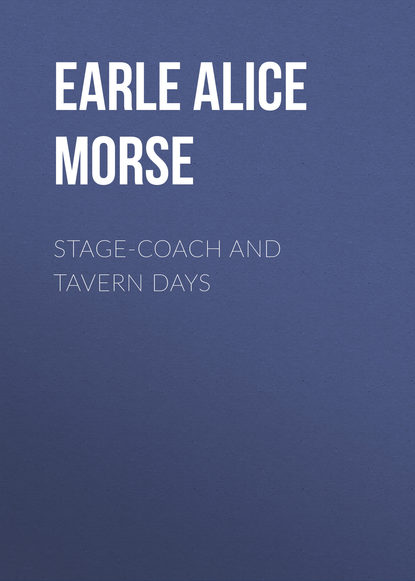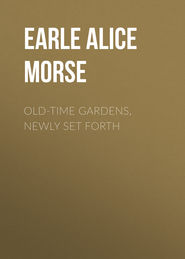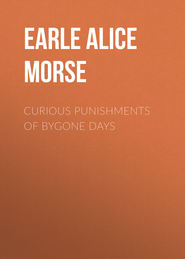По всем вопросам обращайтесь на: info@litportal.ru
(©) 2003-2024.
✖
Stage-coach and Tavern Days
Настройки чтения
Размер шрифта
Высота строк
Поля
It was far worse in these matters in England than in the colonies. Mr. Ashton tells us that in one night over two thousand one hundred men were pressed in London alone. Riot and bloodshed accompanied those infamous raids; sometimes a whole town turned out to resist the officers and ship’s men.
CHAPTER IX
THE TAVERN PANORAMA
We have to-day scores of places of amusement, and means of amusement, where in earlier days all diversions centred at the tavern. The furnishing of food and shelter to travellers and to horses, and of liquid comfort to neighbors, was not the only function of the tavern, nor the meeting for cheerful interchange of news and sentiment. Whatever there was of novelty in entertainment or instruction, was delivered at the tavern, and it served as the gathering place for folk on scores of duties or pleasures bent. There was in fact a constant panorama passing within the walls and before the doors of an old tavern, not only in the shape of distinguished, picturesque, and unwonted guests, but through the variety of uses to which the tavern was put. It would be impossible to enumerate them all. Many of the chapters of this book indicate some of them. We can simply glance at a few more of the most common and of the most interesting ones.
Though guests of colonial days are often named as having visited the old taverns which still linger intact, the names of importance which are most frequently heard are those of Revolutionary heroes and visitors, those of Franklin, Washington, and Lafayette being most proudly enumerated. Franklin was a great local traveller. His post-office affairs took him frequently along the road. He was fond of visiting, and people were naturally fond of having him visit them. He was such a welcome guest that he need not have entered a tavern from Maine to Georgia. Washington made several trips through the states, one of much ceremony. He gives the names of the taverns at which he stopped.
I have been in tavern-rooms honored a century ago by the sleeping presence of Washington, but I have never slept in them. I would rather look at them than sleep in them; and I have moralized over the simplicity and lack of luxury which was the best that the tavern could offer, even to that great man.
Lafayette was made welcome in many private houses in his tour in 1824, but he also was a tavern guest. His journal is preserved in Paris, untranslated. In it he tells of seeing the well-known Landing of Lafayette plates and dishes for the first time at a tavern in a small town in western New York.
All the statesmen of the South stopped at taverns on the old National road: Harrison, Houston, Taylor, Polk, and Allen. Homespun Davy Crockett, popular General Jackson, stately Henry Clay, furnished a show for the country by-standers to gape at. In the Northern states Daniel Webster was the god whose coming was adored. A halo of glory shed by his presence still hangs round many a tavern room, and well it may, for he was a giant among men.
To show the variety of the tavern panorama let me quote what Edwin Lasseter Bynner wrote of the inns of Boston: —
“They were the centres of so much of its life and affairs, the resort at once of judge and jury, of the clergy and the laity, of the politician and the merchant; where the selectmen came to talk over the affairs of the town, and higher officials to discuss the higher interests of the province; where royal governors and distinguished strangers were entertained alike with the humblest wayfarer and the meanest citizen; where were held the carousals of roistering red-coat officers, and the midnight plottings of muttering stern-lipped patriots; where, in fine, the swaggering ensign of the royal army, the frowning Puritan, the obnoxious Quaker, the Huguenot refugee, and the savage Indian chief from the neighboring forest might perchance jostle each other in the common taproom.”
Naturally the tavern proved the exhibition place and temporary lodging-place of all secular shows which could not be housed in the meeting-house. It contained the second assembly room in size, and often the only other large room in town save that devoted to religious gatherings. Hence, when in Salem in 1781 “the Sentimentalists and all Volontiers who are pleased to encourage the extensive Propogation of Polite Literature” were invited to attend a book auction by a “Provedore and Professor of Auctioneering,” this sale of books was held at Mr. Goodhue’s tavern. At the American Coffee-house in Boston the firm that vendued books within doors also sold jackasses on the street.
“Monstrous Sights” found at the tavern a congenial temporary home, where discussion of their appearance was held before the tavern bar, while the tavern barn restrained and confined the monster if he chanced to be a wild beast. A moose, a walrus, a camel, a lion, a leopard, appeared in succession in Salem taverns, chiefly at the Black Horse. Then came a wonder of natural history, a Pygarg, said to be from Russia. We have a description of it: it had “the likeness of a camel, bear, mule, goat, and common bullock”; it is spoken of in the book of Deuteronomy, Chapter XIV. I am not sure that we would recognize our native American moose if he were not called by name, in the creature advertised as having “a face like a mouse, ears like an ass, neck and back like a camel, hind-parts like a horse, tail like a rabbit, and feet like a heifer.” Cassowaries, learned pigs, learned horses, and rabbits were shown for petty sums. Deformed beasts and persons were exhibited. Pictures, “prospects,” statues, elaborate clocks, moving puppets, and many mechanical contrivances could be viewed in the tavern parlor.
“Electrical machines” were the wonder of their day. Solemn professors and gay “fakirs” exhibited them from tavern to tavern. The first lightning-rods also made a great show. Shortly after the invention of balloons, came their advent as popular shows in many towns. They often ascended from the green in front of the tavern. They bore many pompous names, – “Archimedial Phaetons,” “Vertical Aerial Coaches,” “Patent Fœderal Balloons.” The public was assured that “persons of timid nature” would find nothing to terrify them in the ascent. They were not only recommended as engines of amusement and wonder, but were urged upon “Invaletudinarians” as hygienic factors, in that they caused in the ascent the “sudden revulsion of the blood and humours” of aeronautic travellers.
The Bunch of Grapes housed Mr. Douglas when he delivered his famous lecture on “Heads, Coats of Arms, Wigs, Ladies’ Head Dresses,” etc.; it was an office for John Hurd, an early insurance broker, chiefly for marine risks. Nearly all the first insurance offices were in taverns.
One intelligent chronicler relates: —
“The taverns of Boston were the original business Exchanges; they combined the Counting House, the Exchange-office, the Reading-room, and the Bank: each represented a locality. To the Lamb Tavern, called by the sailors ‘sheep’s baby,’ people went ‘to see a man from Dedham’ – it was the resort of all from Norfolk County. The old Eastern Stage House in Ann Street was frequented by ‘down Easters,’ captains of vessels, formerly from the Penobscot and Kennebec; there were to be seen groups of sturdy men seated round an enormous fire-place, chalking down the price of bark and lumber, and shippers bringing in a vagrant tarpaulin to ‘sign the articles.’ To the Exchange Coffee-House resorted the nabobs of Essex County; here those aristocratic eastern towns, Newburyport and Portsmouth, were represented by ship owners and ship builders, merchants of the first class.”
The first attempt at the production of plays in New England was a signal for prompt and vital opposition. Little plays called drolls were exhibited in the taverns and coffee-houses; such plays as Pickle Herring, Taylor riding to Brentford, Harlequin and Scaramouch. About 1750 two young English strollers produced what must have been a mightily bald rendering of Otway’s Orphans in a Boston coffee-house; this was a step too far in frivolity, and stern Boston magistrates took rigid care there were no more similar offences. Many ingenious ruses were invented and presented to the public to avoid the hated term and conceal the hated fact of play acting. “Histrionic academies” were a sneaking introduction of plays. In 1762 a clever but sanctimonious manager succeeded in crowding his company and his play into a Newport tavern. Here is his truckling play-bill: —
“KINGS ARMS TAVERN NEWPORT RHODE ISLAND
On Monday, June 10th, at the Public Room of the Above Inn will be delivered a series of
Moral DialoguesIn Five Parts
Depicting the evil effects of jealousy and other bad passions and Proving that happiness can only spring from the pursuit of Virtue.
Mr. Douglass – Will represent a noble magnanimous Moor called Othello, who loves a young lady named Desdemona, and, after he marries her, harbours (as in too many cases) the dreadful passion of jealousy.
Of jealousy, our being’s bane
Mark the small cause and the most dreadful pain.
Mr. Allyn – Will depict the character of a specious villain, in the regiment of Othello, who is so base as to hate his commander on mere suspicion and to impose on his best friend. Of such characters, it is to be feared, there are thousands in the world, and the one in question may present to us a salutary warning.
The man that wrongs his master and his friend
What can he come to but a shameful end?
Mr. Hallam – Will delineate a young and thoughtless officer who is traduced by Mr. Allyn and, getting drunk, loses his situation and his general’s esteem. All young men whatsoever take example from Cassio.
The ill effects of drinking would you see?
Be warned and fly from evil company.
Mr. Morris – Will represent an old gentleman, the father of Desdemona, who is not cruel or covetous, but is foolish enough to dislike the noble Moor, his son-in-law, because his face is not white, forgetting that we all spring from one root. Such prejudices are very numerous and very wrong.
Fathers beware what sense and love ye lack!’
Tis crime, not colour, that makes the being black.
Mr. Quelch – Will depict a fool who wishes to become a knave, and, trusting to one, gets killed by one. Such is the friendship of rogues! Take heed!
Where fools would become, how often you’ll
Perceive the knave not wiser than the fool.
Mrs. Morris – Will represent a young and virtuous wife, who being wrongfully suspected, gets smothered (in an adjoining room) by her husband.
Reader, attend, and ere thou goest hence
Let fall a tear to helpless innocence.
Mrs. Douglass – Will be her faithful attendant who will hold out a good example to all servants male and female, and to all people in subjection.
Obedience and gratitude
Are things as rare as they are good.
Various other Dialogues, too numerous to mention here, will be delivered at night, all adapted to the mind and manners. The whole will be repeated on Wednesday and on Saturday. Tickets, six shillings each, to be had within. Commencement at 7. Conclusion at half-past ten: in order that every Spectator may go home at a sober hour and reflect upon what he has seen, before he retired to rest.
God save the King
Long may he sway.
East, north, and south
And fair America.”
We can see the little public room of the tavern with its rows of chairs and benches at one end and the group of starveling actors at the other, who never played a greater farce than when they set up as being solely ministers of piety and virtue.
“Consorts” of music were given in the taverns, and, most exciting of all, lotteries were drawn there. This licensed and highly approved form of gambling had the sanction of the law and the participation of every community. Churches had lotteries “for promoting public worship and the advancement of religion.” Colleges and schools thus increased their endowments. Towns and states raised money to pay the public debt by means of lotteries.
It was asserted that “the interests of literature and learning were supported, the arts and sciences were encouraged, religion was extended, the wastes of war were repaired, inundation prevented, travel increased, and the burthen of taxes lessened by lotteries.” Many private lotteries were drawn at the taverns, which were thronged at that time with excited ticket-owners.
Lodges of Freemasons in America, following the custom which prevailed in England, met at the taverns. In Philadelphia they met at Peg Mullen’s Beefsteak House. The lodges were often known by the names of the taverns at which the meetings were held. One Boston lodge met at the Royal Exchange Tavern, and hence was known by its name. That hostelry was, however, so popular with the visiting public that sometimes the brethren had to suspend their meetings for want of room. In December, 1749, the Masons of Boston celebrated the feast of St. John, and appeared in procession on the streets. This excited the greatest curiosity and ridicule. Joseph Green wrote a poem in which the chief object of his wit was Luke Vardy, the keeper of the Royal Exchange: —
“Where’s honest Luke, that cook from London?
For without Luke the Lodge is undone.
’Twas he who oft dispell’d their sadness,
And filled the Brethren’s hearts with gladness.
Luke in return is made a brother
As good and true as any other.
And still, though broke with age and wine,







